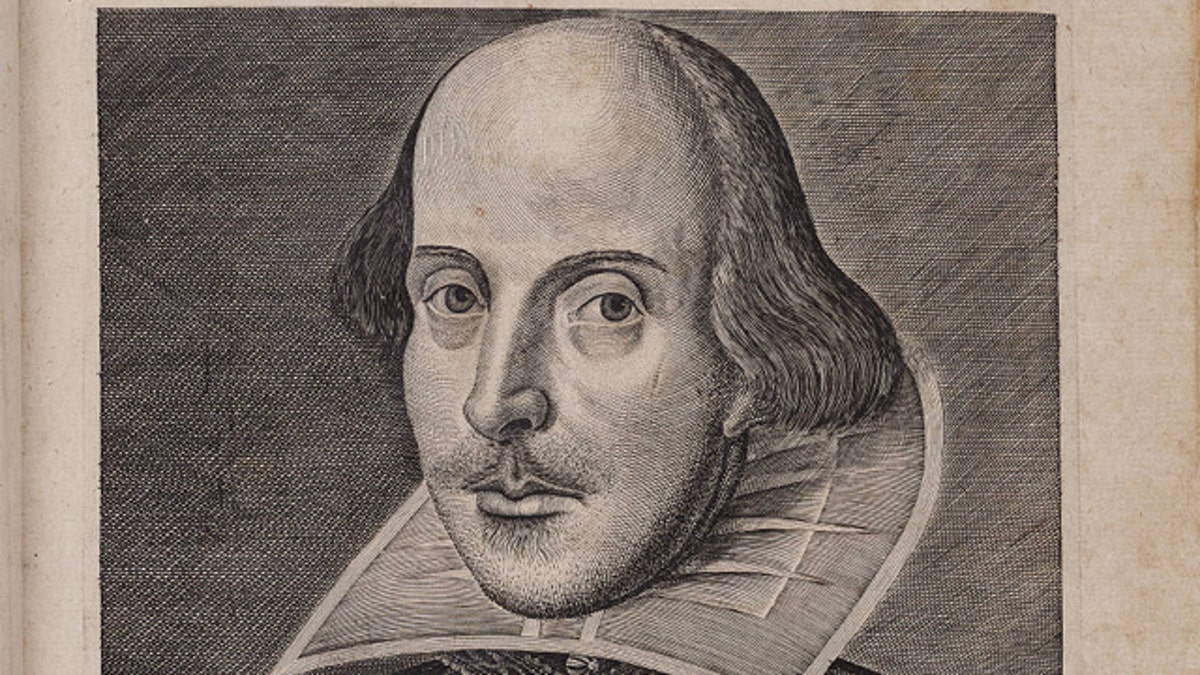
(Beinecke Rare Book & Manuscript Library, Yale University)
To dig, or not to dig? That's the latest question.
Paleontologists are looking to examine the remains of William Shakespeare, hoping to unlock the mysteries of the life and death of the world's most famous playwright -- and to prove that the poet once puffed.
The bard is buried under a local church in Stratford-upon-Avon. And a team of scientists, led by Francis Thackeray -- an anthropologist and director of the Institute for Human Evolution at the University of the Witwatersrand in Johannesburg, South Africa -- have submitted a formal application to the Church of England for permission to probe the site where he sleeps, perchance where he dreams.
Safely, of course.
“We have incredible techniques,” Thackeray told FoxNews.com, referring to the “nondestructive analysis” the team has planned. “We don’t intend to move the remains at all.” Instead the team will perform the forensic analysis using state-of-the-art technology to scan the bones and create a groundbreaking reconstruction.
The first job is to confirm the playwright’s identity, Thackeray said.
"We’ll have to establish the age and gender of the individual," he told FoxNews.com. The team also plans DNA tests for not only Shakespeare, but also the remains of his wife and sister, also buried at the Holy Trinity Church.
For Thackeray, the next priority is solving the longstanding mystery of Shakespeare’s final days. “We would like to find out the cause of death, which is not known historically.”
If all goes well, he believes the research could ultimately establish a full health history and build a picture of the kind of life the writer led. “Growth increments in the teeth will reveal if he went through periods of stress or illness -- a plague for example, which killed many people in the 1600s," Thackeray explained.
The team also looks to address a controversial suggestion Thackeray made a decade ago, when he examined a collection of two dozen pipes found in the playwright’s garden and determined that Shakespeare was an avid marijuana smoker.
Thackeray claimed the devices were used to smoke cannabis, a plant actively cultivated in Britain at the time. The allegation has provoked disbelief and anger among some fans of the bard.
Prof. Stanley Wells, honorary president of the Shakespeare Birthplace Trust, told the Daily Mail, "I would be happy if they did open it up because it could put an end to a lot of fruitless speculation."
“If we find grooves between the canine and the incisor, that will tell us if he was chewing on a pipe as well as smoking,” Thackeray told FoxNews.com, citing similar evidence found in Virginia.
Others may have issues with digging up the body, which goes directly against the late playwright's dying wishes. Shakespeare, famously fearful of the happenings of his own remains after his death, had a curse engraved on his tomb:
"Good frend for Jesus sake forebeare,/ To digg the dust encloased heare;/ Bleste be the man that spares thes stones,/ And curst be he that moves my bones."
Philip Schwyzer, a senior lecturer at Exeter University, told Reuters that "Shakespeare had an unusual obsession with burial and a fear of exhumation. The stern inscription on the slab has been at least partially responsible for the fact that there have been no successful projects to open the grave."
That all may change, however -- assuming the Church goes along with the unusual request.
And curses aside, the blessings of the Church of England may be hard to come by. The Church has so far denied knowledge of the project, perhaps thinking something's rotten in the state of Johannesburg.
“We haven’t received a request,” a Church spokesman told FoxNews.com.
Perhaps that's for the best? What a piece of work is man.








































